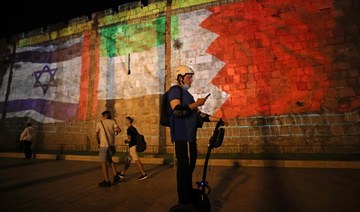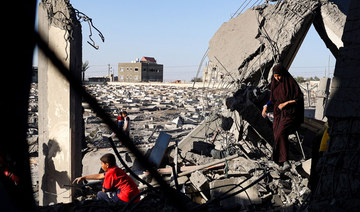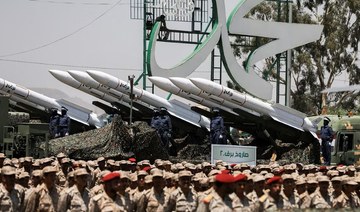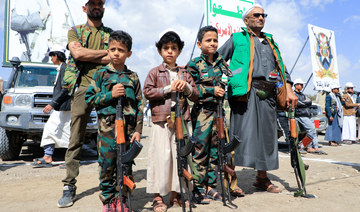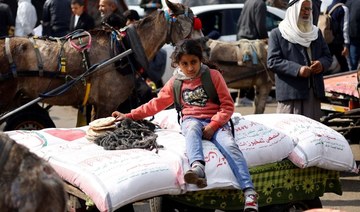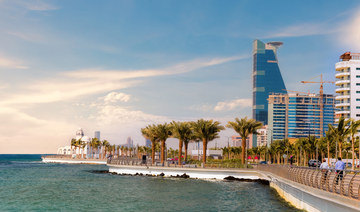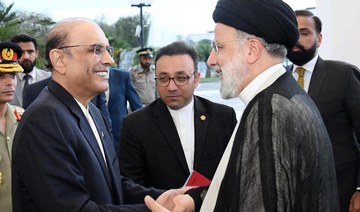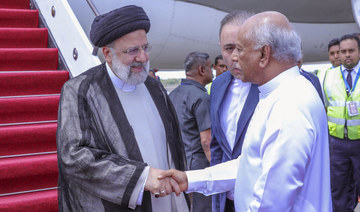DUBAI, United Arab Emirates: Bahrain said Monday it broke up a plot by militants backed by Iran earlier this year to launch attacks on diplomats and foreigners in the island nation home to the US Navy’s 5th Fleet.
The announcement came hours after Saudi state television and a Bahraini local newspaper implied the plot was new in their reporting Sunday night, just days after the island kingdom normalized relations with Israel. Bahraini government officials, who routinely claim breaking up plots by militants backed by Iran, did not respond to requests for comment from The Associated Press over the confusion.
The details of the plot became public as tensions between Iran and the US remain high after the Trump administration claimed to have re-invoked all United Nations sanctions on Tehran over its nuclear program — something disputed by other world powers. The militants reportedly sought revenge for the US drone strike that killed Iranian Gen. Qassem Soleimani in January, something long threatened by his colleagues in Iran’s paramilitary Revolutionary Guard.
Iran’s mission to the UN dismissed Bahrain’s claim of Tehran being involved as just “another instance in a long line of preposterous and false allegations, with no basis in truth.”
“It appears there is no limit to Iran-bashing by the US and its client states in the region, who are trying to divert attention from their recent betrayal to Palestinians and their own people,” mission spokesman Alireza Miryousefi told the AP.
The Saudi state TV report aired previously unseen footage of what appeared to be police raiding a home with a hidden passage. The footage showed assault rifles and explosives, apparently seized in the raid.
Nine militants have been arrested, while another nine are believed to be in Iran, the Saudi state TV report said.
Authorities uncovered the plot after finding an explosive on the street believed to have been planted to target a “foreign delegation,” the pro-government Bahraini newspaper Akhbar Al-Khaleej reported, citing the Interior Ministry. The ministry accused the Guard of supporting the militants, who also had surveilled oil sites and military bases, the newspaper said. The militants also planned on assassinating bodyguards of Bahraini officials, the newspaper said.
It wasn’t clear when all the arrests and alleged plots took place, as the Akhbar Al-Khaleej report referred to incidents dating as far back as 2017. The newspaper linked the militants to the Al-Ashtar Brigade, a Shiite group that has claimed responsibility for a number of bombings and attacks in Bahrain, including two that killed police. The group has been sanctioned by the US
Bahrain’s Interior Ministry later published what it described as a “clarification” saying the cases dated to the start of the year and “is not new.” However, media is tightly controlled on the island and access to such trials is routinely limited, suggesting authorities at the least encouraged the initial reporting.
Bahrain is home to the 5th Fleet, which patrols the waterways of the Mideast. Officials have worried in the past that the sailors and Marines attached to the base in Manama could be targeted, as well as others who make up the 7,000 American troops there. Cmdr. Rebecca Rebarich, a spokeswoman for the 5th Fleet, declined to comment and referred questions to the Bahraini government.
Bahrain, an island off the coast of Saudi Arabia, just last week normalized relations with Israel alongside the United Arab Emirates, in part over their joint suspicion of Iran. The UAE has said their move also pushed Israel to halt its contentious plan to annex occupied West Bank land sought by the Palestinians. Civil society groups in Bahrain have opposed the normalization decision.
Israel’s Foreign Ministry declined to comment on the reported arrests in Bahrain.
Iran under Shah Mohammad Reza Pahlavi had pushed to take over Bahrain after the British left the country, although Bahrainis in 1970 overwhelmingly supported becoming an independent nation and the UN Security Council unanimously backed that. Since Iran’s 1979 Islamic Revolution, Bahrain’s rulers have blamed Iran for arming militants on the island. Iran denies the accusations.
Bahrain says it broke up militant attack plot in early 2020
https://arab.news/mkmvj
Bahrain says it broke up militant attack plot in early 2020
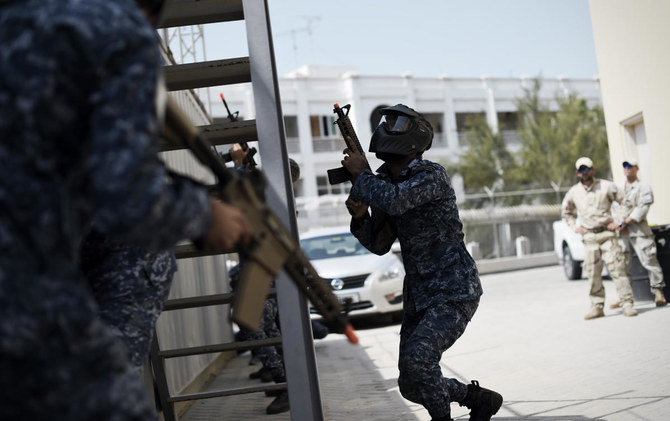
- The plot targeting diplomats and foreign nationals was foiled earlier in the year
- Authorities uncovered the plot after finding an explosive on the street believed to have been planted to target a ‘foreign delegation’
UAE, Bahrain call for joint work to contain tensions threatening regional stability
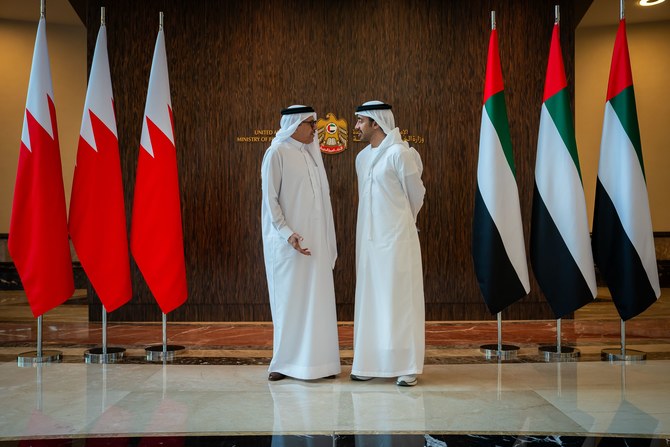
DUBAI: UAE Minister of Foreign Affairs Sheikh Abdullah bin Zayed Al Nahyan received his Bahraini counterpart Dr. Abdul Latif bin Rashid Al Zayani in Abu Dhabi on Wednesday.
Sheikh Abdullah bin Zayed welcomed the Bahraini Foreign Minister, and during the meeting held at the ministry’s headquarters in Abu Dhabi, they discussed the fraternal relations between the two countries, and ways to enhance Emirati-Bahraini cooperation at various levels, WAM reported.
Sheikh Abdullah stressed during the meeting that the UAE and Bahrain are linked by historical relations that are becoming more established, developed and growing, and that they also constitute an important tributary to joint Gulf and Arab work.
He also stressed that the current challenges facing the region require intensifying cooperation, coordination and joint work to contain all tensions that threaten its stability, security and safety of its people.
A blast near a ship off Yemen may mark a new attack by Houthi rebels after a recent lull
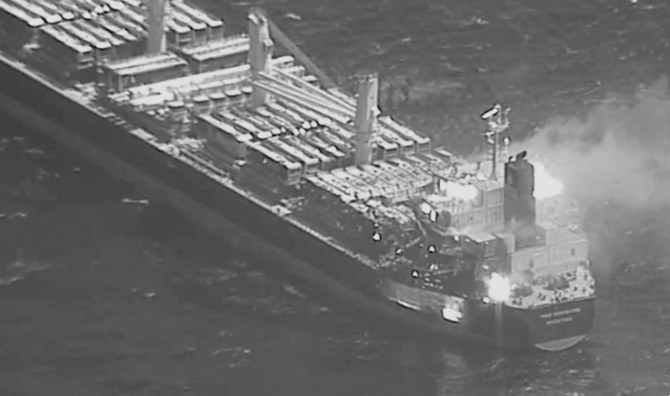
- Houthis have launched more than 50 attacks on shipping, seized one vessel and sank another since November
- The explosion happened some 130 kilometers southeast of Djibouti in the Gulf of Aden
JERUSALEM: A ship near the strategic Bab el-Mandeb Strait saw an explosion in the distance Wednesday, marking what may be a new attack by Yemen’s Houthi rebels through the crucial waterway for international trade.
The explosion, reported by the British military’s United Kingdom Maritime Trade Operations center, comes after a relative lull from the Houthis after they launched dozens of attacks on shipping in the region over Israel’s ongoing war on Hamas in the Gaza Strip.
The Houthis did not immediately claim responsibility for the blast, but suspicion fell on the group as they’ve repeatedly targeted ships in the same area. It typically takes the Houthis several hours before acknowledging their assaults.
The explosion happened some 130 kilometers southeast of Djibouti in the Gulf of Aden.
“The master of a merchant vessel reports an explosion in the water a distance form the vessel,” the UKMTO said. “Veseel and crew reported safe. Authorities are investigating.”
The private maritime security firm Ambrey separately reported the apparent attack.
The Houthis have launched more than 50 attacks on shipping, seized one vessel and sank another since November, according to the US Maritime Administration.
Houthi attacks have dropped in recent weeks as the rebels have been targeted by a US-led airstrike campaign in Yemen and shipping through the Red Sea and Gulf of Aden has declined because of the threat. American officials have speculated that the rebels may be running out of weapons as a result of the US-led campaign against them and firing off drones and missiles steadily in the last months.
The Houthis have said they would continue their attacks until Israel ends its war in Gaza, which has killed more than 34,000 Palestinians there. The war began after Hamas-led militants attacked Israel on Oct. 7, killing 1,200 people and taking some 250 others hostage.
The ships targeted by the Houthis largely have had little or no direct connection to Israel, the US or other nations involved in the war. The rebels have also fired missiles toward Israel, though they have largely fallen short or been intercepted.
The assaults on shipping have raised the profile of the Houthis, who are members of Islam’s minority Shiite Zaydi sect, which ruled Yemen for 1,000 years until 1962. The group seized Sanaa, Yemen’s capital, in late 2014. A Saudi-led coalition has been battling the group in a stalemated conflict since 2015.
Gaza could surpass famine thresholds in six weeks, WFP official says

- A UN-backed report published in March said famine was imminent and likely to occur by May in northern Gaza
GENEVA: The Gaza Strip could surpass famine thresholds of food insecurity, malnutrition and mortality in six weeks, an official from the World Food Programme said on Wednesday.
“We are getting closer by the day to a famine situation,” said Gian Caro Cirri, Geneva director of the World Food Programme (WFP).
“There is reasonable evidence that all three famine thresholds — food insecurity, malnutrition and mortality — will be passed in the next six weeks.”
A UN-backed report published in March said that famine was imminent and likely to occur by May in northern Gaza and could spread across the enclave by July. On Tuesday, a US official said the risk of famine in Gaza, especially in the north, was very high.
Cirri was speaking at the launch of a report by the Global Network Against Food Crises, an alliance of humanitarian and development actors including United Nations agencies, the World Bank, the European Union and the United States.
In its report, the network described the 2024 outlook for the Middle East and Africa as extremely concerning due to the Gaza war and restricted humanitarian access, as well as the risk of the conflict spreading elsewhere in the region.
“As for Gaza, the conflict makes it difficult and sometimes impossible to reach affected people,” Cirri said.
“We need to scale up massively our assistance... But under the current conditions, I’m afraid the situation will further deteriorate.”
The United Nations has long complained of obstacles to getting aid in and distributing it throughout Gaza in the six months since Israel began an aerial and ground offensive against Gaza’s ruling Islamist militant group Hamas.
Israel has denied hindering supplies of humanitarian aid and blames aid agencies for inefficiencies in distribution.
Israel’s military campaign has reduced much of the territory of 2.3 million people to a wasteland with a humanitarian disaster unfolding since Oct. 7, when Hamas ignited war by storming into southern Israel.
Cirri said that the only way to steer clear of famine in Gaza was to ensure immediate and daily deliveries of food supplies.
“They’ve been selling off their belongings to buy food. They are most of the time destitute,” he said.
“And clearly some of them are dying of hunger.”
Jordan King, Kuwait Emir stress on importance of reducing regional tensions, avoid escalation
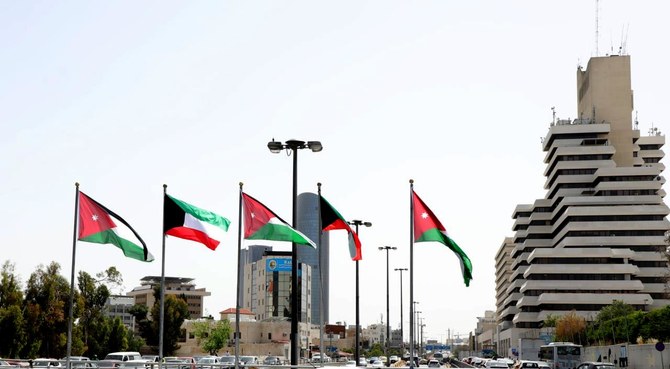
DUBAI: King of Jordan Abdullah II and Emir of Kuwait Sheikh Mishal Al-Ahmad Al-Jaber Al-Sabah stressed on the importance of reducing tensions in the Middle East and avoiding military escalation, according to Petra News Agency.
A joint Jordanian-Kuwaiti statement was issued on Wednesday after the Emir’s two day state visit to the Kingdom.
Both leaders discussed ways to enhance a joint Arab action aimed at confronting emerging regional challenges as well as serving common Arab issues.
The leaders affirmed their support for any steps that ensure the security and stability of the region and stressed the importance of giving priority to dialogue and diplomatic solutions in resolving differences and conflicts.
Their Majesties and Highnesses discussed reaching a just solution to the Palestinian issue and implementing the two-state solution.
The discussions also included talks on investment and tourism, as well as ways to increase trade between Jordan and Kuwait.
Iran cuts Syria presence after strikes blamed on Israel: monitor
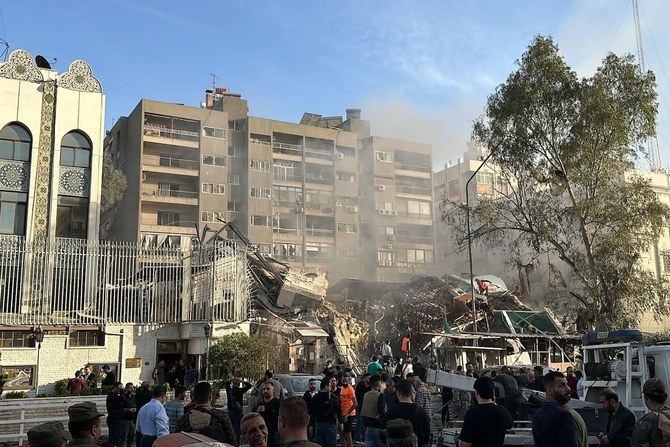
- Iran withdrew its forces from southern Syria, including both Quneitra and Daraa provinces
- Iran has said repeatedly that it has no combat troops in Syria, only officers to provide military advice and training
BEIRUT: Iran has reduced its military footprint in Syria after a succession of strikes blamed on Israel, a source close to Iran-backed militant group Hezbollah and a war monitor said Wednesday.
Iran has provided military support to Syrian government forces through more than a decade of civil war but a series of strikes targeting its commanders in recent months has prompted a reshaping of its presence, the sources said.
“Iran withdrew its forces from southern Syria,” including both Quneitra and Daraa provinces, which abut the Israeli-annexed Golan Heights, the source close to Hezbollah said.
But it still maintains a presence in other parts of the country, the source added.
Recent months have seen a series of strikes on Iranian targets in Syria, widely blamed on Israel, culminating in an April 1 strike that levelled the Iranian consulate in Damascus and killed seven Revolutionary Guards, two of them generals.
That strike prompted Iran to launch a first-ever direct missile and drone attack against Israel on April 13-14 that sent regional tensions spiralling.
But Iran had already begun drawing down its forces after a January 20 strike that killed five Revolutionary Guards in Damascus, including their Syria intelligence chief and his deputy, the source close to Hezbollah said.
Britain-based war monitor, the Syrian Observatory for Human Rights, said Iranian forces had withdrawn from Damascus and southern Syria.
Iran-backed Lebanese and Iraqi fighters had taken their place, Observatory chief Rami Abdel Rahman said.
Iran has said repeatedly that it has no combat troops in Syria, only officers to provide military advice and training.
But the Observatory says as many as 3,000 Iranian military personnel are present in Syria, supported by tens of thousands of Iran-trained fighters from countries including Lebanon, Iraq and Afghanistan.
Abdel Rahman said that many of Iran’s advisers had left Syria over the past six months, although some remained in Aleppo province in the north and in Deir Ezzor province in the east.



